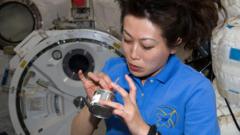In a historic leap for culinary science, a European Space Agency (ESA) project has launched an experiment into orbit that could revolutionize food consumption for astronauts. The initiative, which was onboard a SpaceX Falcon 9 rocket, focuses on the potential of lab-grown food—specifically proteins for items like steak and mashed potatoes—designed to withstand the severe conditions of space.
Successfully cultivating food in low gravity and heightened radiation not only looks to address the financial burden of feeding astronauts, which can soar to £20,000 a day, but also aligns with future ambitions for humans as a multi-planetary species. According to Dr. Aqeel Shamsul, CEO of Frontier Space, the aim is to create factories capable of producing essential food supplies both in orbit and on the Moon.
The experiment involves growing vital food components in bioreactors, where fermentation processes similar to those used in beer production convert genetic modifications into usable food elements. Although lab-grown chicken and steak have mostly found approval in other countries, their commercial release in the UK is still pending.
A compact version of the bioreactor is currently orbiting Earth for a three-hour trial before splashing down in the Atlantic, off the coast of Portugal. The data retrieved will inform improvements in future bioreactor designs intended for space use.
At Imperial College London's Bezos Centre for Sustainable Proteins, culinary professionals are also on board, developing appetizing recipes inspired by lab-grown components. Though regulatory issues prevent the immediate use of lab-grown materials for cooking, chefs are experimenting with traditional ingredients to create diverse dishes.
Military-readiness often dictates the nature of astronaut diets, but pioneers like Helen Sharman, the UK’s first astronaut, are enthusiastic about the potential impact of lab-grown foods on taste and nutrition in space. Enhanced options could encourage better eating habits for astronauts, mitigating weight loss and other health concerns arising from a lack of variety in their diets.
Should these lab-grown experiments be successful, the vision is clear: astronauts may someday enjoy gourmet meals far beyond the current menu of freeze-dried foods, marking a significant step towards comfortable living conditions in outer space.
Successfully cultivating food in low gravity and heightened radiation not only looks to address the financial burden of feeding astronauts, which can soar to £20,000 a day, but also aligns with future ambitions for humans as a multi-planetary species. According to Dr. Aqeel Shamsul, CEO of Frontier Space, the aim is to create factories capable of producing essential food supplies both in orbit and on the Moon.
The experiment involves growing vital food components in bioreactors, where fermentation processes similar to those used in beer production convert genetic modifications into usable food elements. Although lab-grown chicken and steak have mostly found approval in other countries, their commercial release in the UK is still pending.
A compact version of the bioreactor is currently orbiting Earth for a three-hour trial before splashing down in the Atlantic, off the coast of Portugal. The data retrieved will inform improvements in future bioreactor designs intended for space use.
At Imperial College London's Bezos Centre for Sustainable Proteins, culinary professionals are also on board, developing appetizing recipes inspired by lab-grown components. Though regulatory issues prevent the immediate use of lab-grown materials for cooking, chefs are experimenting with traditional ingredients to create diverse dishes.
Military-readiness often dictates the nature of astronaut diets, but pioneers like Helen Sharman, the UK’s first astronaut, are enthusiastic about the potential impact of lab-grown foods on taste and nutrition in space. Enhanced options could encourage better eating habits for astronauts, mitigating weight loss and other health concerns arising from a lack of variety in their diets.
Should these lab-grown experiments be successful, the vision is clear: astronauts may someday enjoy gourmet meals far beyond the current menu of freeze-dried foods, marking a significant step towards comfortable living conditions in outer space.

















